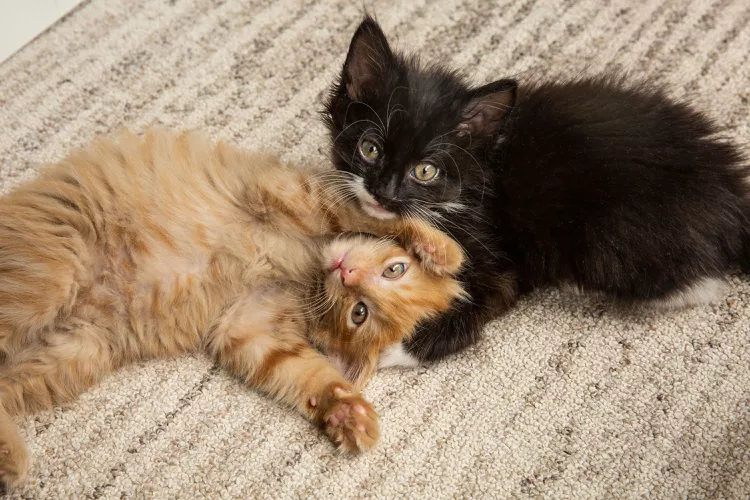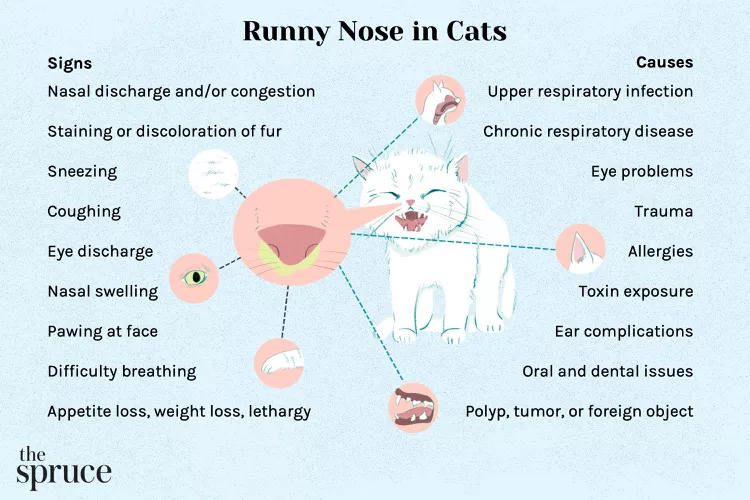
Does your cat constantly wake you up at night by playing on the bed, lobbying to be fed, or soliciting cuddle time when all you want to do is sleep? Your cat is most likely seeking attention, leading to a disturbance in your sleep cycle.
Your good night's sleep is extremely important to your health and shouldn't be interrupted by your kitty. There's no need to suffer from cat-related sleep deprivation, though. Below, we break down why your cat might be waking you at night and how to solve this behavioral issue.
In their natural habitats, cats are nocturnal creatures. They sleep almost all day and play or hunt all night. There are a few reasons why your kitty might be prompted to wake you up in the dead of the night.
Unusual bouts of interrupted sleep can be a sign of illness, ranging from pain from a toothache or arthritis to something more serious like hyperthyroidism, diabetes, or neurological conditions.
There are a number of techniques that you can try to train (or retrain) your cat not to wake you up at night. Some will require some behavior modifications on the pet owner's part, so make sure that all family members are on board with the changes. Before you go to bed, decide how you will react to your cat. The middle of the night is not the best time to make a decision.
Help your cat readjust its internal clock by scheduling an interactive hour-long play period about an hour before bedtime. Follow the play session with a light kitty-appropriate snack like a small treat, which should leave your cat not angling for food in the middle of the night.
If your cat wakes you up anyway, ignore it. After trying this a few times, your cat will learn that it's not getting the attention it wants from you and may leave you alone.
If you have a sleep disorder, it's best never to encourage your cat to sleep on your bed. This means making your bedroom off-limits at all times. Give your cat a comfortable cat bed in a spare room, a corner of the living room (with a screen for privacy), or even a bathroom. If you do this, make sure wherever the cat is kept at night it has access to water and a litter pan. Try rubbing a bit of catnip on the bed initially to encourage the cat to use it.
A single cat may easily become bored when it's home alone all day and may expect its human companion to provide attention at night. A second cat may offer companionship during the day and may lessen those nocturnal urges to wake you for play. This is especially true of kittens, who have much more energy to burn during their first year of growth. Two kittens are almost always better than one and often is a great time for cats to be introduced. Selecting a second adult cat for your home to get along with your first adult cat can be very difficult and should be done carefully so that your initial cat has a companion that does not cause it stress or vice versa.
If your cat interrupts your sleep early in the morning to seek breakfast, avoid feeding it at the time of its demand or it will continue to wake you up this early. Having a safe, designated area such as a spare bedroom where your cat can sleep, eat and drink, and potty that is not in your bedroom can be helpful to your sleep schedule and relationship with your cat.
Cats don't like surprises and are most happy when their household revolves around a predictable schedule. Giving your cat a set time for food, exercise, interactive play, grooming, and petting will go a long way toward maintaining its well-being and giving you a good night's sleep, every night.
If you find yourself awakened by a noisy or annoying cat, try to create a peaceful environment to help you (and your cat) get some restful sleep. Again, make sure that all family members are aware of the steps you are taking. If you ignore your cat, but someone else feeds in the middle of the night, the ignoring is for nothing.
Even if you close your bedroom door to your cat, a determined feline might scratch at the door for a while, but it will eventually give up and either go to sleep or find some other activity. You can help prevent damage to your door by either mounting a vertical scratch pad on it, trimming your kitty's nails regularly, or having your vet fit your cat with plastic nail caps.
Several commercial products are available that play soothing sounds that may help you sleep (with your cat on the other side of the door). You can select from bird sounds, ocean or waterfall sounds, or just white noise. Earphones or earbuds will help amplify and enhance the sleep-inducing effects.
Try to prevent those pouncing, biting attacks on your toes at night by using room-darkening shades to completely darken your room. Replace any digital or fluorescent-dial clocks by the bedside with non-illuminated versions or just use your phone.
If all else fails and your cat's noises or scratching at the door keeps you awake, use swimmers' earplugs, which effectively seal the ear canal and should give you some relief.

Why Two Kittens Are Better Than One
There are benefits of adopting two kittens, such as more feasible training and companionship between them.
Everything You Need to Know About Raising Your First Cat
Whether you are thinking about getting a cat or just adopted your first one, these are the things to know to make your relationship a lasting one.
How Can I Tell the Sex of a Cat?
Telling male and female cats apart can be difficult for those who don't know what they're looking for. Here are helpful tips to discover their sex.
Runny Nose in Cats: Causes and Treatment
Cats get runny noses due to upper respiratory issues, but many conditions can cause this. Learn the causes of runny noses in cats and the associated signs. Find out how vets diagnose and treat cats with runny noses.
How Long Can You Safely Leave Canned Cat Food Out?
You cannot safely leave canned cat food out all day. Twenty to 30 minutes is the max, so give smaller portions and reheat food for later feedings.
Meat Byproducts in Cat Food
Most cat experts recommend premium brands of cat food that avoid ingredients like byproducts and chicken meal. Learn what to look for on the label.
How Much Wet Food to Feed a Cat Every Day
The amount of wet food your cat needs depends on factors such as age, weight, body condition, and lifestyle. Learn how much wet food to feed your cat.
Taurine for Cats
Taurine is an essential animal protein in your cat's diet. Learn more about the various ways it supports your feline's body.
The Different Types of Pet-Friendly Workplaces
Discover the different types of pet-friendly workplaces and the benefits they offer employees. Learn how to create a pet-friendly workplace and the best practices for pet owners.
8 Halloween Safety Tips for Pets
The spooky holiday can be overstimulating and even dangerous for pets. Here's how to avoid the problems caused by toxic candy and incessant doorbells.
Why You Should Keep Cooked Bones Away From Your Dog This Holiday Season
People should be aware of the dangers of cooked bones, especially around the holidays when they might be more accessible to your pup.
Can Dogs Eat Squash? Here's What a A Vet Thinks
Dogs can safely eat squash as long as it's prepared correctly. Find out how to properly feed this versatile fruit to your dog.
16 Small Cat Breeds That Are Petite Purring Machines
Small cat breeds like the Singapura and munchkin may be smaller than an average housecat, but they leave a giant imprint on your heart.
10 Best Cats With Big Ears
Cats with big ears often look extra endearing. Check out some common big-eared cats, including the Abyssinian, Devon Rex, Siamese, Sphynx, and more.
Javanese (Colorpoint Longhair): Cat Breed Profile, Characteristics & Care
The Javanese is a semi-longhaired, color-pointed cat of Siamese type. They are related to the Siamese, Colorpoint Shorthair, and Balinese breeds.
How to Stop Aggression in Dogs
Dog aggression can be a serious behavior issue for pet owners. Learn how to stop aggression in dogs before someone gets hurt.
Should Dogs Be Allowed on Furniture?
Should you let your dog on the couch or in the bed with you? Are there any reasons we should not let dogs on the furniture? Here's what to know.
Why Do Dogs Eat Rocks?
One of the most common non-food items for dogs to eat are rocks. Here's what to know about why dogs eat them and how can you stop your dog from eating rocks.
Why Dogs Get Aggressive and How to Stop It
Why is your dog biting you aggressively? Sometimes dogs can become aggressive with little warning. Find out what causes your dog to become aggressive so you can work with the behavior.
Thai Ridgeback: Dog Breed Characteristics & Care
Learn all about the Thai Ridgeback, a rare breed from Thailand. Find out how to care for the loyal dog and where to buy or adopt one.